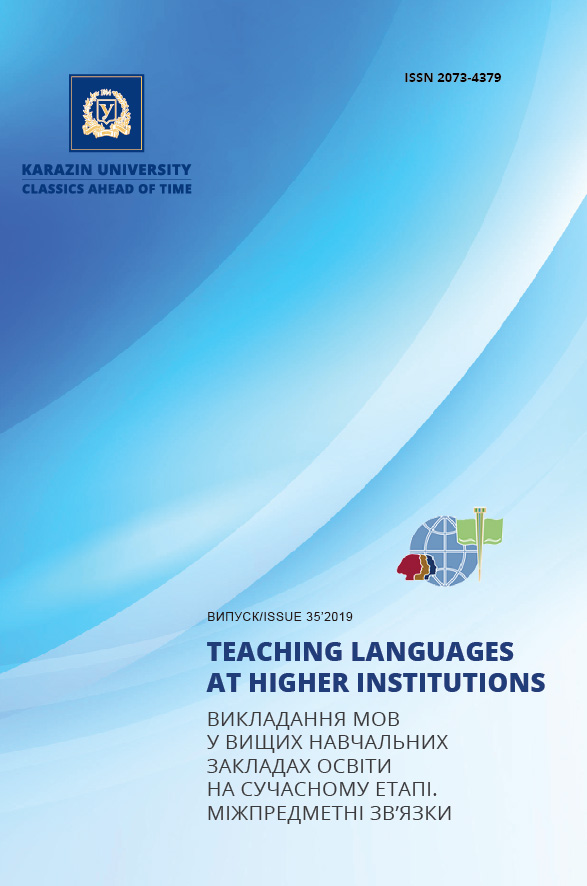Methods of analysisof text and discourse categories by foreign students of philology
Abstract
The article substantiates the principles of analysis of text and discourse categories in the process of formation of foreign undergraduates’ ability to analyze the literary text. These principles include the following: 1) correspondence of the texts selected for analysis with the prototype version; 2) taking into consideration the relationship and determinacy of all categories in the text, and the understanding that the isolation and analysis of each category individually is carried out exclusively for educational purposes; 3) taking into consideration the discursive nature of the text; 4) understanding the analysis of the text as a creative process of perception, interpretation, increment of meaning on the basis of the linguistic fabric of the text and the experience of the linguistic existence of the recipient; 5) analysis of the text is a new level of cognition of the world: the knowledge of the functioning of the language in different regions of Russia, the culture of the native speakers, their moral foundations and traditions.
Based on the analysis of the category of intertextuality, the author describes the stages of the work and the system of tasks for the formation of professional skills of foreign students majoring in philology. The first stage (preparation for the lesson) is proposed to be provided with special materials: a text with theoretical data structured and compressed in 3-4 pages, supplemented with questions for self-control and 1-2 simple test tasks. At the same stage, undergraduates read a literary miniature text with a vocabulary. This text (0.5-1.5 pages) is to be analyzed in the classroom, as well as 2-3 texts of journalistic style of the same volume each subordinated to the enrichment of the recipientʼs presupposition. The second stage (work in the classroom) includes a system of exercises: a) aimed at enriching the vocabulary and syntactic structure of speech with special terminology and structures that are used in the analysis; b) aimed at understanding, interpretation, and increment of meanings in the semantic space of the intertext; c) aimed at the complete text analysis.
Downloads
References
Babenko, L.G. and Kazarin, YU.V. (2005). Lingvisticheskij analiz hudozhestvennogo teksta. Teorija i praktika [Linguistic analysis of the literary text. Theory and practice]. Moscow: Flinta: Nauka [in Russian].
Bart, R. (1989). Izbrannye raboty: Semiotika. Poetika [Selected works: Semiotics. Poetics]. G.K. Kosikova (Trans., Comps., Ed.). Moscow: Progress [in Russian].
Bolotnova, N.S. (2007). Filologicheskij analiz teksta [Philological analysis of the text]. Moscow: Flinta: Nauka [in Russian].
Filippov, K.A. (2003). Lingvistika teksta. Kurs lekcij [Text linguistics. A course of lectures]. St. Petersburg: Izd-vo S.-Peterb. un-ta [in Russian].
Gasparov, B.M. (1996). Jazyk. Pamjat. Obraz. Lingvistika jazykovogo sushchestvovanija [Language. Memory. Image. Linguistics of linguistic existence.]. Moscow: Novoe literaturnoe obozrenie [in Russian].
Himik, V.V. and Volkova, L.B. (Eds.). (2017). Kultura rechi. Nauchnaya rech. Moscow: Izdatelstvo Jurajt [in Russian].
Kotyurova, M.P. and Bazhenova, E.A. (2008). Kultura nauchnoj rechi: tekst i ego redaktirovanie [Culture of the scientific speech: text and editing]. Moscow: Flinta: Nauka [in Russian].
Kubryakova, E.S. (2001). O tekste i kriterijah ego opredelenija [On the text and criteria for its definition]. Tekst. Struktura i semantika [Text. Structure and semantics]. Moscow: Sport Akadem Press, Vol. 1, pp. 72–81 [in Russian].
Lebedeva, M.N. (2016). Mikrozhanry sovremennoj prozy [Microgenres of the modern prose]. Extended abstract of candidate’s thesis. Tver: Tverskoj gosuniversitet [in Russian].
Lotman, Y.M. (2004). Tekst v tekste [A text within a text]. Obrazovatelnye tekhnologii [Educational technologies], 1, pp. 30–42 [in Russian].
Rogova, K.A. (Ed.). (2011). Tekst: teoreticheskie osnovanija i principy analiza [Text: theoretical foundations and principles of analysis]. St. Petersburg: Zlatoust [in Russian].
Selivanova, E.A. (2002). Osnovy lingvisticheskoj teorii teksta i kommunikacii [Fundamentals of the linguistic theory of text and communication]. Kiev: Fitosociocentr [in Russian].
Serazhim, K.S. (2012). Tekstoznavstvo [Textology]. Kyiv: Kyiv unіversity [in Ukrainian].
Tameryan, T.Yu. (2009). Istoriko-etimologicheskij slovar latinskih zaimstvovanij [Historical etymological dictionary of Latin borrowings]. Vladikavkaz: Izd-voSOGU [in Russian].
Valgina, N.S. (2003). Teoriya teksta [The theory of the text]. Moscow: Logos [in Russian].
Vartanyanc, A.D. and Yakubovskaya, M.D. (1989). Posobie po analizu hudozhestvennogo teksta dlja inostrannyh studentov-filologov (tretij – pyatyj gody obuchenija) [Manual on the analysis of literary text for foreign students of Philology (third-fifth years of study)]. Moscow: Russkij jazyk [in Russian].

